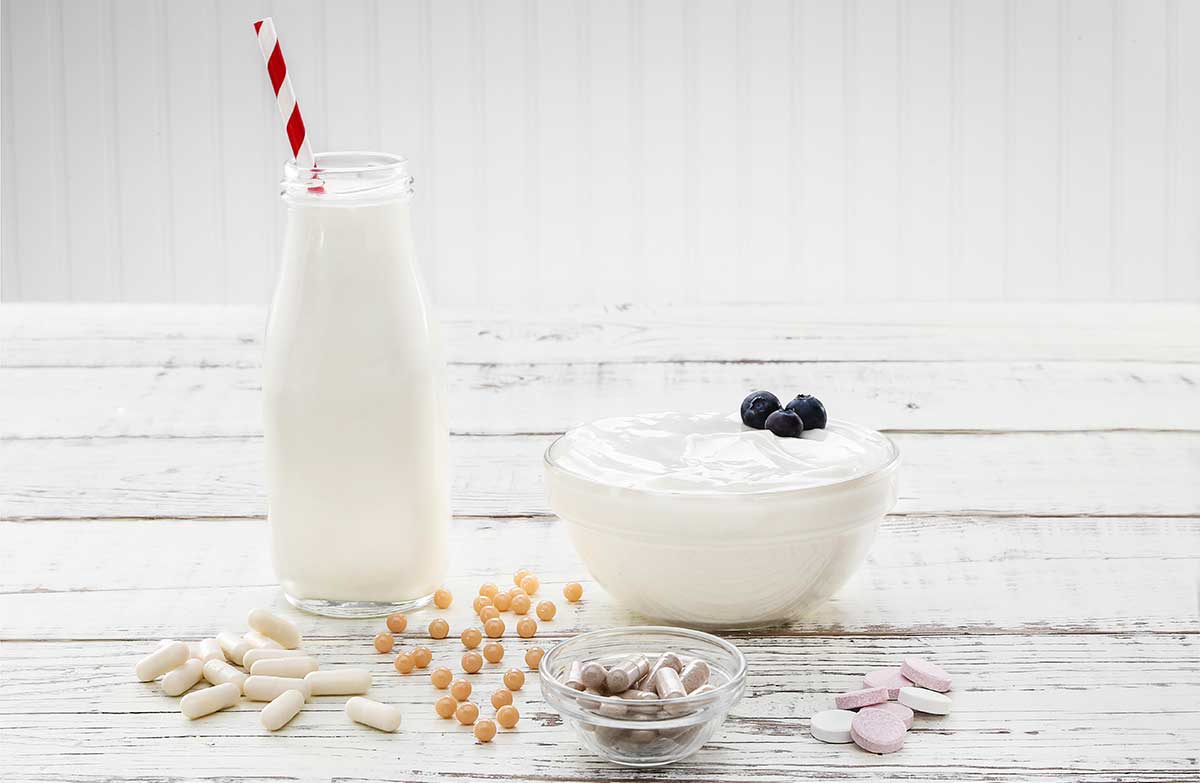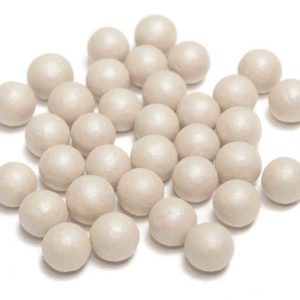 Probiotics are defined by the Food and Agriculture Organization of the United Nations (FAO) and the World Health Organization (WHO) as “live microorganisms which when administered in adequate amounts confer a health benefit on the host.”1 Your body contains about 100 trillion bacteria—that’s more than 10 times the number of human cells. These microorganisms make up 1–3% of the body’s mass—that’s about two to six pounds of bacteria in your entire body.
Often found in fermented dairy products, probiotics are the live active cultures that support healthy gut flora. Your gastrointestinal tract contains over 400 bacterial species. Small amounts can be found in your stomach and small intestines, but the majority is found in your large intestine. These good bacteria are essential for healthy digestion, immune function, and assist with synthesizing vitamins and nutrients, metabolizing some medications, supporting the development and functioning of the gut, and aiding in the elimination of toxins.
Probiotics don’t stay in your body, like food, they pass out of your system, so you must replenish with active strains regularly. Foods that contain natural probiotics are yogurt, kefir, aged cheeses, kimchi, sauerkraut, miso, tempeh and some kombucha beverages.(Check out our great article, Top 9: Powerful Probiotic Foods, to learn more!)
Probiotics are defined by the Food and Agriculture Organization of the United Nations (FAO) and the World Health Organization (WHO) as “live microorganisms which when administered in adequate amounts confer a health benefit on the host.”1 Your body contains about 100 trillion bacteria—that’s more than 10 times the number of human cells. These microorganisms make up 1–3% of the body’s mass—that’s about two to six pounds of bacteria in your entire body.
Often found in fermented dairy products, probiotics are the live active cultures that support healthy gut flora. Your gastrointestinal tract contains over 400 bacterial species. Small amounts can be found in your stomach and small intestines, but the majority is found in your large intestine. These good bacteria are essential for healthy digestion, immune function, and assist with synthesizing vitamins and nutrients, metabolizing some medications, supporting the development and functioning of the gut, and aiding in the elimination of toxins.
Probiotics don’t stay in your body, like food, they pass out of your system, so you must replenish with active strains regularly. Foods that contain natural probiotics are yogurt, kefir, aged cheeses, kimchi, sauerkraut, miso, tempeh and some kombucha beverages.(Check out our great article, Top 9: Powerful Probiotic Foods, to learn more!)
Gut Health
Taking care of your digestive tract is essential for maintaining overall health and a sense of well-being. After all, it ensures that your body is able to break down food, absorb nutrients and eliminate food waste properly. There are many general types of bacteria used as probiotics. A large number of probiotics come from the Lactobacillus or Bifidobacterium genera and some yeasts, such as Saccharomyces, can also act as probiotics. A growing body of scientific evidence suggests that you can treat and even prevent some illnesses with foods and supplements.2 Since they contain certain kinds of live bacteria, they help to restore the natural balance of good bacteria in the intestinal tract. Your large intestine is home to hundreds of trillions of bacteria. Luckily, most of the bacteria living inside of you and on top of your skin are neutral or even beneficial, performing many vital body functions like immune and digestive support. Probiotics can help in reducing the incidence of infectious diarrhea and antibiotic-associated diarrhea.3 They may also help people with Crohn’s disease and irritable bowel syndrome. Several small studies suggest that certain probiotics may help maintain remission of ulcerative colitis and prevent relapse of Crohn’s disease.4Immune Function
There’s a close connection between the bacteria in your colon and the immune system—and probiotics have been linked to enhanced immune responses. About 80 percent of your immune system is located in the digestive system, which means a healthy gut plays an important role in protecting the body against diseases. Several studies suggest probiotics regulate the functions of mucosal immune cells and intestinal epithelial cells. These are the cells responsible for sensing and promoting a positive immune response against diseases, including several immune diseases, such as allergy, eczema and viral infection. Probiotics can help maintain the delicate balance of macrophages and T and B lymphocytes which are reasonable for recognizing and fighting foreign invaders in the body.5Brain Health
Probiotics may be beneficial for brain function and may actually influence the way your brain responds to the environment. Changing gut bacteria through your diet can affect your brain function according to a UCLA study. In a four week study, researchers found that women who regularly consumed beneficial bacteria known as probiotics through yogurt showed robust brain function, improved cognition and increased ability in identifying emotions in facial expressions.6 Anyone, from infants to the elderly, can take probiotics and there are different delivery systems—capsule, powder, liquid—available depending on dosage and preference. Since they are live bacteria, most probiotics require refrigeration; however, some strains are formulated to be shelf-stable. They have been freeze-dried and are sealed in moisture barrier packaging to achieve sufficient survival at room temperature.Ready to try some of these beneficial bacteria? SHOP NOW
1 Report of a Joint FAO/WHO Expert Consultation on Evaluation of Health and Properties of Probiotics in Food Including Powder Milk with Live Lactic Acid Bacteria. Córdoba, Argentina, October 1-4, 2001. http://www.who.int/foodsafety/publications/fs_management/en/probiotics.pdf Accessed July 24, 2012. 2 Khani S. Hosseini H. Taheri M. Probiotics as an Alternative Strategy for Prevention and Treatment of Human Diseases: A Review. Inflammation & Allergy-Drug Targets, 2012; 11:79-89. 3 Hickson, M.; D’Souza, A.L.; Muthu, N.; Rogers, T.R.; Want, S.; Rajkumar, C.; Bulpitt, C.J. Use of probiotic Lactobacillus preparation to prevent diarrhea associated with antibiotics: randomized double-blind placebo controlled trial. BMJ 2007, 355, 80. 4 Verna, Elizabeth C., and Susan Lucak. “Use of Probiotics in Gastrointestinal Disorders: What to Recommend?” Therapeutic Advances in Gastroenterology 3.5 (2010): 307–319. PMC. Web. 23 Nov. 2015. 5 Yan, Fang, and D.B. Polk. “Probiotics and Immune Health.” Current opinion in gastroenterology 27.6 (2011): 496–501. PMC. Web. 23 Nov. 2015. 6 Consumption of Fermented Milk Product with Probiotic Modulates Brain Activity Tillisch, Kirsten et al. Gastroenterology, Volume 144, Issue 7, 1394 – 1401.e4





















 VIEW ALL
VIEW ALL




